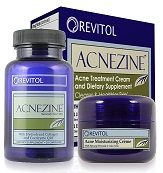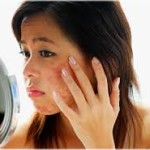 Acne problems vary with people, hormone fluctuations, stress, nutrition and just the time in a person’s life. There are some people who never have an acne problem at all!
Acne problems vary with people, hormone fluctuations, stress, nutrition and just the time in a person’s life. There are some people who never have an acne problem at all!
Doctors estimate that 4 out 5 people between the ages of 12 and 24 will get acne at least once in their lives. Acne problems also happen to people who are in their 20s, 30s and 40s, although less frequently than in those who are teens. (1)
While a definitive cause has not been found for acne problems, there are identifiable triggers. In adult women, acne can be triggered by the increased hormone levels of pregnancy, birth control pills and her menstrual cycle. Others find that triggers involve their diet – high in fats, chocolate or junk food. Men also suffer from acne when hormone levels surge during their teen years. (2)
Acne problems happen when the oil that is secreted by the oil glands in our skin get stopped up on the way to the surface. Oil production is a natural process and it happens around the time of puberty. Irregular shedding of dead skin, over production of oil, build up of bacteria, an unhealthy diet, hormonal changes and stress are all triggers that cause acne.
Acne has several different forms and several different symptoms. You can see whiteheads or pustules when the oil is stopped up near the surface of the skin. If the oil is stuck a bit deeper the pimple hurts when you press on it. But if the oil gets stuck deep in the skin it produces cystic acne.
References:
(1) KidsHealth.org: Acne
http://kidshealth.org/kid/health_problems/skin/acne.html
(2) National Institute of Arthritis and Musculoskeletal and Skin Diseases: What is Acne?
http://www.niams.nih.gov/health_info/acne/acne_ff.asp
(3) Journal of Ayub Medical College: Prevelance of Mental Health Problems in Acne Patients
http://www.ncbi.nlm.nih.gov/pubmed/11873431
(4) PsychCentral.com: For Teens, Acne Problems May be More than Skin Deep
(5) U.S. National Library of medicine: Rosacea
http://www.ncbi.nlm.nih.gov/pubmedhealth/PMH0001882/
(6) Proceedings of the Royal Society of Medicine: Acne Conglobata
http://www.ncbi.nlm.nih.gov/pmc/articles/PMC2184445/
| Advertisement | |
 |
|


Leave a Reply